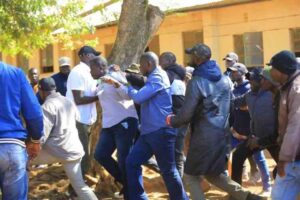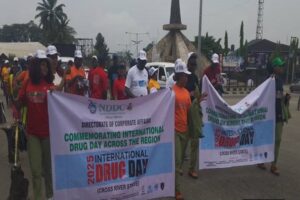
…say over 6,800 Nigerians killed in six months
Stakeholders on Thursday called for an overhaul of the country’s security architecture to tame escalating attacks by terrorists.
They also recommended deployment of advance technology especially in border communities to combat insecurity.
These suggestions were made at this year’s lecture and awards organised by the Crime Reporters Association of Nigeria (CRAN), in Lagos.
Lamenting that over 6,800 Nigerians were killed between January and June this year, guest speaker, Mustapha Kazeem Lusty, said technology capable of detecting, preventing, and disrupting crime in real time must be deployed to contain the situation.
His lecture titled “Harnessing Technological Innovations for Crime Prevention and Control in Nigeria”, Lusty, an engineer, told the gathering comprising security and law enforcement chiefs, academia, monarchs and media practitioners that traditional approaches were no longer sufficient.
He warned that the surge in killings and attacks were eroding public trust in security services and pushing citizens to self-help.
To reverse the trend, he proposed a six-step framework including AI-powered early warning systems; a National Intelligence Vision Centre; encrypted community reporting platforms; deployment of surveillance drones and body-worn cameras; secure communication networks, and strengthened digital financial monitoring.
He stressed that localisation of technology, stronger forensic and cyber capabilities, joint intelligence dashboards, and transparent public security reporting were essential for sustainable reform.
While acknowledging that technology alone cannot solve the root causes of insecurity, Lusty emphasised that combining innovation with strong institutions, community engagement, and ethical governance could significantly strengthen Nigeria’s fight against terrorism, banditry, and kidnapping.
Similarly, a private security expert, Bone Efoziem, advocated increased technological measure to monitor and secure Nigeria’s porous land, air, and sea borders.
According to Efoziem, most security threats confronted by the country were as a result of unmonitored land routes, noting that many villages along the borders served as informal entry points, making it difficult for conventional border security to function effectively.
“Almost every village around the border is a potential route into the country. Even security officers on the ground cannot monitor all these points effectively. This is where technology, like drones and remote monitoring systems, become essential,” he said.
Efoziem said the available equipment and manpower were insufficient to tackle insurgents and armed criminals operating along the borders.
He stressed that troops usually encountered better-equipped insurgents with night vision goggles and heavier weaponry, while border surveillance remains largely manual.
He emphasised the need to redefine border security strategies such that technology can be integrated to detect illegal movements, track suspicious activities, and enable rapid intervention.
He also urged community engagement platforms to allow Nigerians to anonymously report cross-border threats, improving real-time intelligence collection.
“Strengthening border security with technology is critical to reducing the flow of arms, drugs, and criminals into Nigeria,” Efoziem said.
‘Retrieved firearms now in wrong hands’, says monarch
Speaking at the gathering, the Jagunmolu of Somolu/Bariga Kingdom in Lagos, Oba Gbolahan Akanbi Timson, raised serious concerns over the fate of licensed firearms retrieved from lawful owners through an Executive Order on mop-up, alleging that many of the weapons were in the hands of criminals across Lagos and parts of the Southwest.
The monarch said while licensed firearm owners complied with the directive to surrender their weapons, the arms were neither returned, destroyed, nor properly accounted for.
According to him, guns collected from individuals with valid five-year licenses were taken from divisional police offices to state commands, then to Abuja, a process he described as opaque and troubling.
“Those guns were seized not because they were unlicensed or used to commit crimes, but simply because an executive order was issued,” he said.
“Today, some of those guns have found their way back into Lagos in the wrong hands. They were not destroyed, and they were not returned. Yet they are now being used by people who never bought them or held any certification,” he said.
The royal father warned that the circulation of such weapons was worsening insecurity, enabling armed groups in communities to operate with impunity and intimidate residents.
He challenged crime reporters to investigate how licensed arms seized under the executive directive were diverted back into public spaces, insisting that accountability was necessary to curb the rising misuse of firearms.
“When licensed guns taken through official channels begin to appear with criminal elements, insecurity cannot be controlled. This is a matter that must be exposed and thoroughly probed,” he added.
Oba Timson further urged journalists to revive the courage and investigative rigour that once defined crime reporting in Nigeria, noting that fearless media scrutiny was essential to uncovering failures in the country’s security system.





